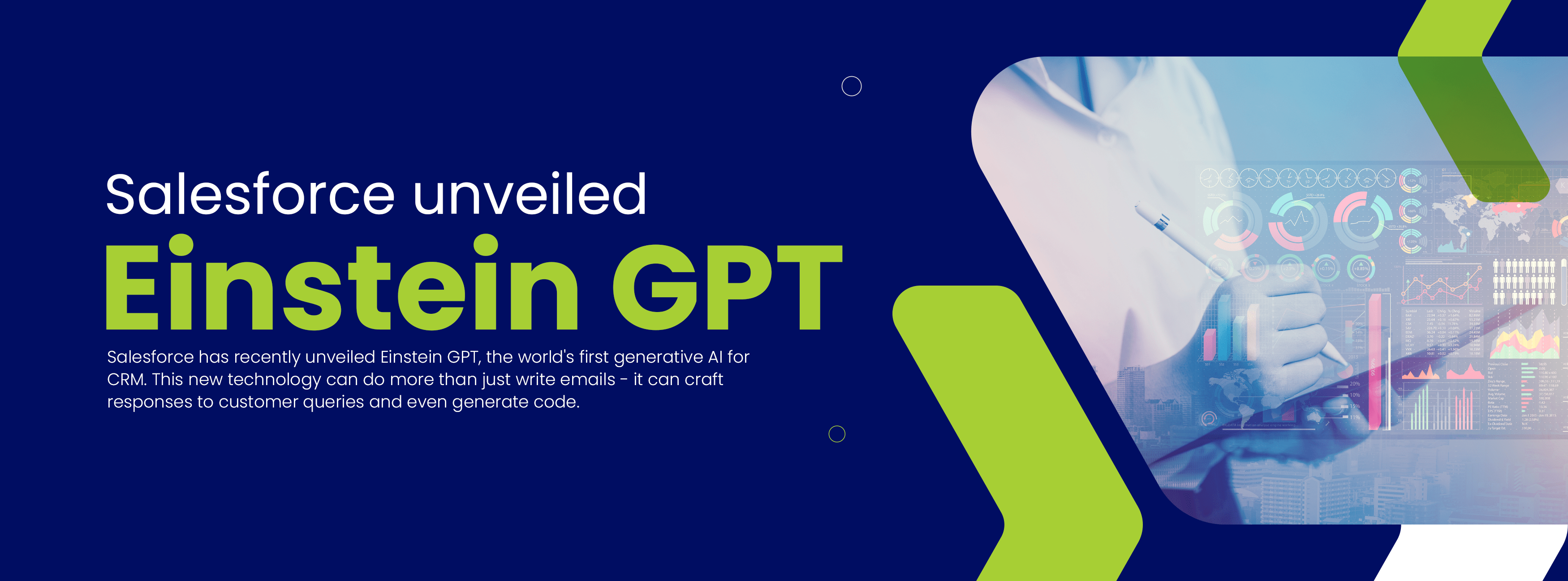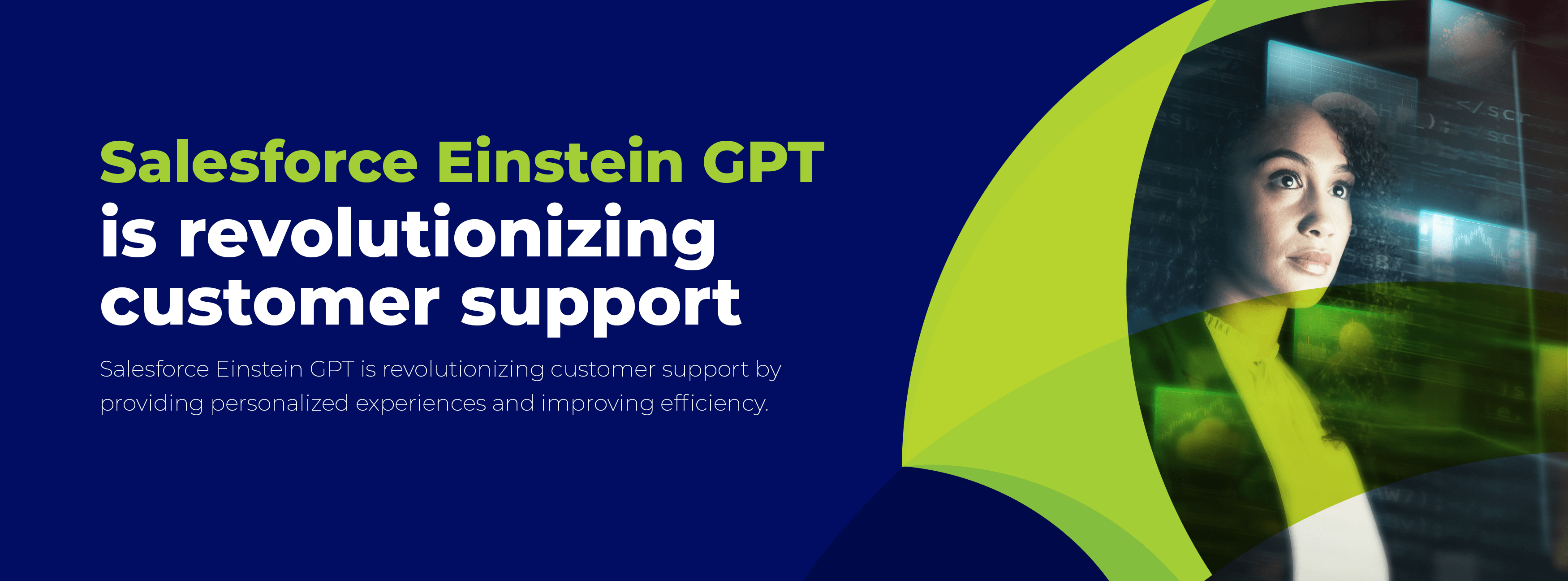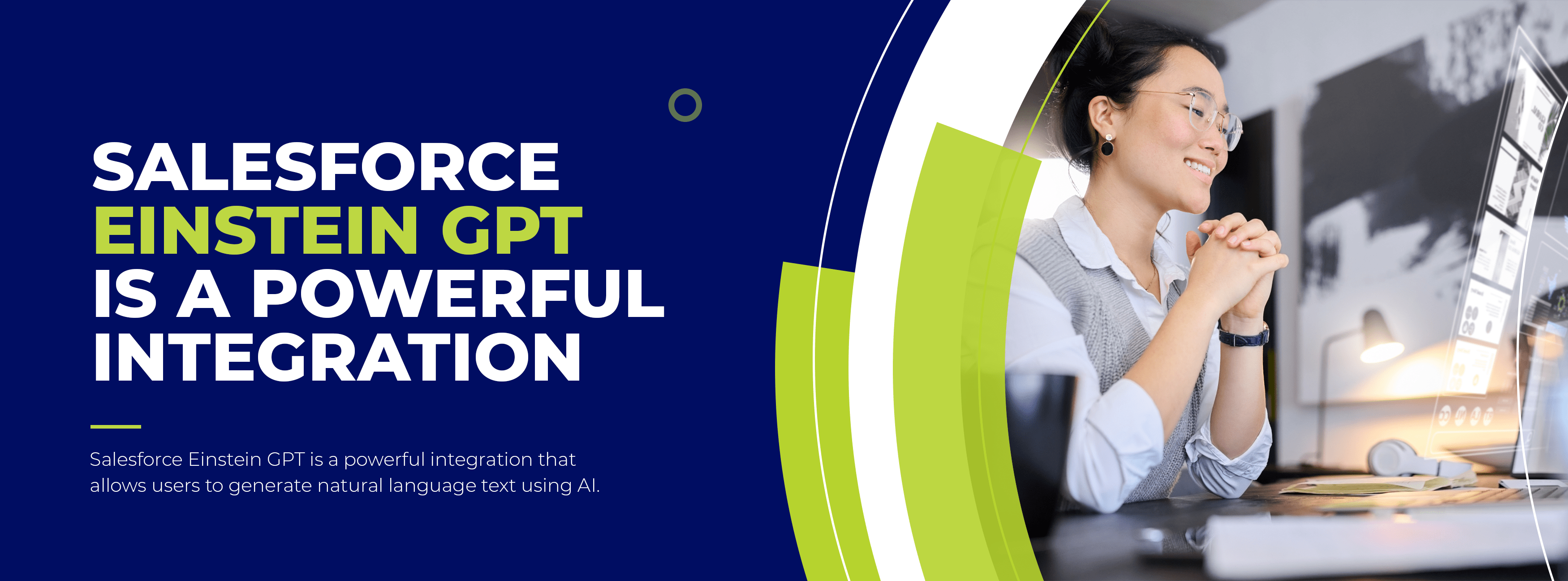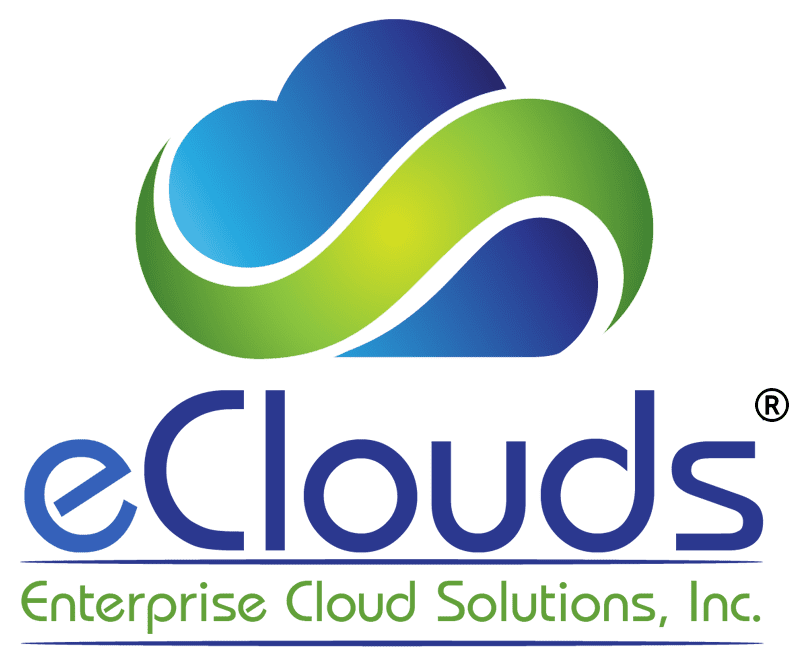Unlock the Power of Salesforce Einstein GPT: Revolutionizing Customer Support
- What is Salesforce Einstein GPT?
- How Does Salesforce Einstein GPT Work?
- Salesforce Einstein GPT Features
- Salesforce Einstein GPT Integration in Salesforce
- Why Salesforce Einstein GPT is Important for Customer Support
- The Benefits of Salesforce Einstein GPT
- How to Get Started with Salesforce Einstein GPT
- Unlocking the Power of Salesforce Einstein GPT for Your Business
- How eClouds Experts Can Help?
What is Salesforce Einstein GPT?
How Does Salesforce Einstein GPT Work?

Salesforce Einstein GPT Features
- Predictive analytics involves using data, statistical algorithms, and machine learning techniques to identify the likelihood of future outcomes based on historical data. Salesforce Einstein GPT uses this technology to help businesses predict customer behavior, identify sales opportunities, and more.
- Natural language processing (NLP) allows machines to understand and interpret human language. Salesforce Einstein GPT leverages NLP to analyze large amounts of text data and generate insights that can be used to improve business outcomes.
- Machine learning is an AI that enables machines to learn and improve from experience without being explicitly programmed. Salesforce Einstein GPT uses machine learning to analyze data and generate insights that can help businesses automate processes, optimize operations, and make better decisions.
- Automated insights and recommendations enable Salesforce Einstein GPT to generate insights and recommendations based on data analysis automatically. This can help businesses save time and make faster decisions.
- Personalized recommendations allow Salesforce Einstein GPT to provide recommendations tailored to individual users based on their preferences and behaviors. This can help businesses improve customer engagement and retention.
- Enhanced customer experience is another key feature of Salesforce Einstein GPT. The platform can provide personalized customer interactions tailored to their needs and preferences by leveraging predictive analytics and natural language processing. This can help businesses improve customer satisfaction and loyalty.
Salesforce Einstein GPT Integration in Salesforce

Salesforce Einstein GPT Integration in Salesforce
The Benefits of Salesforce Einstein GPT
- Personalization: Salesforce Einstein GPT can generate personalized responses based on the customer's needs and preferences, improving the overall customer experience.
- Efficiency: With Salesforce Einstein GPT, customer support teams can automate responses to common queries, reducing response times and increasing efficiency.
- Accuracy: Leveraging natural language processing and machine learning, Salesforce Einstein GPT can accurately interpret customer queries and generate appropriate responses.
- Consistency: With Salesforce Einstein GPT, customer support teams can ensure consistency in responses, regardless of who handles the query.
- Scalability: Salesforce Einstein GPT can handle many customer queries, making it an ideal solution for businesses of all sizes.
How to Get Started with Salesforce Einstein GPT
- Understand the capabilities of Salesforce Einstein GPT: Before getting started with Salesforce Einstein GPT, it is important to understand the capabilities of the integration. Salesforce Einstein GPT utilizes the GPT model, a pre-trained deep learning model capable of generating high-quality natural language text.
- Evaluate your business needs: Once you understand the capabilities of Salesforce Einstein GPT, you should evaluate your business needs to determine how the integration can help you. Consider the areas of your business that could benefit from generating natural language text, such as customer service, sales, or marketing.
- Prepare your data: To use Salesforce Einstein GPT effectively, you need to prepare your data. This includes collecting and organizing your data to ensure its accuracy and relevance.
- Choose the right GPT model: Salesforce Einstein GPT includes several pre-trained GPT models. Choose the model that best suits your business needs and data.
- Fine-tune the GPT model: After choosing the appropriate GPT model, you may need to fine-tune it to optimize its performance for your specific use case. This involves training the model on your data to improve its ability to generate relevant and accurate natural language text.
- Integrate with Salesforce: Once you have fine-tuned the GPT model, you can integrate it with Salesforce. This will allow you to use the generated text within the Salesforce CRM system.
- Monitor and refine: After integrating Salesforce Einstein GPT with your CRM system, monitoring its performance and refining the model as needed is important. This will help to ensure that the generated text continues to provide value to your business.
Unlocking the Power of Salesforce Einstein GPT for Your Business
- Identify use cases: Determine where Salesforce Einstein GPT can add value to your customer support process. Consider common customer queries, support ticket triage, and other repetitive tasks that can benefit from automation.
- Prepare your data: To use Salesforce Einstein GPT effectively, you must provide it with the right data. This includes text data from customer queries, support tickets, and other sources. Ensure the data is of high quality and relevant to your use cases.
- Train your model: Once you have the data, train your Salesforce Einstein GPT model. This involves creating a corpus of text data and fine-tuning the model to recognize specific keywords and phrases. This step is crucial to ensuring the accuracy of the generated responses.
- Test and refine: Test the model on sample queries to ensure it is generating accurate responses. Refine the model as needed, incorporating feedback from customers and support team members.
- Implement and monitor: Implement Salesforce Einstein GPT into your customer support process and monitor its performance. This will help you identify areas for improvement and ensure the technology delivers the expected benefits.

How eClouds Experts Can Help?

Citation Reference
Salesforce Einstein. (n.d.). Retrieved from https://www.salesforce.com/products/einstein/overview/
Einstein Language. (n.d.). Retrieved from https://www.salesforce.com/products/einstein/what-is-einstein/einstein-language/
Salesforce Einstein GPT: What it is and why it matters. (2020, December 14). Retrieved from https://www.salesforce.com/blog/salesforce-einstein-gpt/
Salesforce Trailhead. (n.d.). Einstein Language Basics. Retrieved from https://trailhead.salesforce.com/content/learn/modules/einstein_language_basics
Salesforce Trailhead. (n.d.). Implement an Einstein Language Model. Retrieved from https://trailhead.salesforce.com/content/learn/projects/implement-an-einstein-language-model
Salesforce Trailhead. (n.d.). Build an Einstein Language Model with GPT-3. Retrieved from https://trailhead.salesforce.com/content/learn/projects/build-an-einstein-language-model-with-gpt-3
Salesforce Developers. (n.d.). Salesforce API. Retrieved from https://developer.salesforce.com/docs/atlas.en-us.api_rest.meta/api_rest/intro_what_is_rest_api.htm
Salesforce Developers. (n.d.). Einstein Platform Services. Retrieved from https://developer.salesforce.com/docs/atlas.en-us.einstein_platform_services.meta/einstein_platform_services/einstein_intro.htm
We are eClouds (n.d). Retrieved from the company https://ecloudstrans.wpenginepowered.com/why-eclouds/
Popular Post

A Complete Guide to Understanding Salesforce Sales Cloud

5 Things You Should Consider in Choosing Your Salesforce Implementation Partner

11 Key Benefits of CPQ Every Business Needs to Know

10 Most Common CRM Implementation Challenges that You Must Be Aware Of






